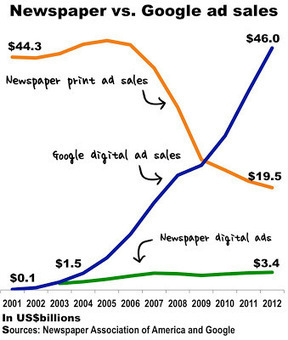"The curator is getting more cred for recognizing good content than the creator is for making good content."

|
Scooped by
Robin Good
July 21, 2013 4:31 PM
|
Tara Hunt, has an interesting article spotlighting the fast growing importance that curators are gradually gaining on the Internet and on the subsequent need to find ways for properly compensating original content creators.
She writes: "...while creators are necessary and amazing, curators are the ones raking in the dough.
I was alerted today by a friend that a video that Carlos and I made for Vine that had become super popular (over 118,000 likes + 77,000 Re-vines) was featured on a Facebook page called Best Vines and making its way around (with over 230,000 likes + 46,000 shares). The page owner lifted the content off of Vine and reposted it on his own page (no credit back to the original). This page has over 6.2M likes.
Now, this video of Ridley took us all of 30 seconds to make and we had no idea it would ‘go viral’, but for people like Will Sasso who appears to make it his full-time gig to make entertaining, engaging content on Vine and other places, this would probably be a bit of a violation.
The curator is getting more cred for recognizing good content than the creator is for making good content."
And she is definitely right.
But as she correctly points out, there are already effective solutions in place, such as the YouTube authorship claiming facility which allows for original creators to digitally mark their own creations while giving full permission to curators to leverage and re-distribute them. This YouTube approach is the one that makes it possible for content creators to receive a share of the advertising revenue coming to YouTube, even when their clips are curated and played back on other sites.
The opportunity is there, not just for textual content, but also for video, music, photography and all of their sub-categories to be curated and monetized for the benefit of everyone.
Insightful. 8/10
Full original article: http://tarahunt.com/2013/07/20/creationcuration/



 Your new post is loading...
Your new post is loading...











Thought provoking, however, montetization of curation is still very limited. Scoop.It & others offer no means for monetization at all. Like content creation, & most everything on the net, compensation for cuation is still a giant question mark.
I've heard everyone from Jaron Lanier to Tim Berners-Lee and a number of other noteworthy tech brains bring up this topic up. How do the creators of content and innovative ideas cash in on the contributions they have made that everyone is passing along and sharing? No one wants their work and thoughts stolen and most everyone I know wants creative people to keep creating what we need and want and would like them rewarded and to be able to earn a decent living doing that. This article is about how we can make sure that happens.
Thanks for this reflexion about contents and their creators in the times of the content curation! Sorry, I didn't intend to make a rhyme. :-/